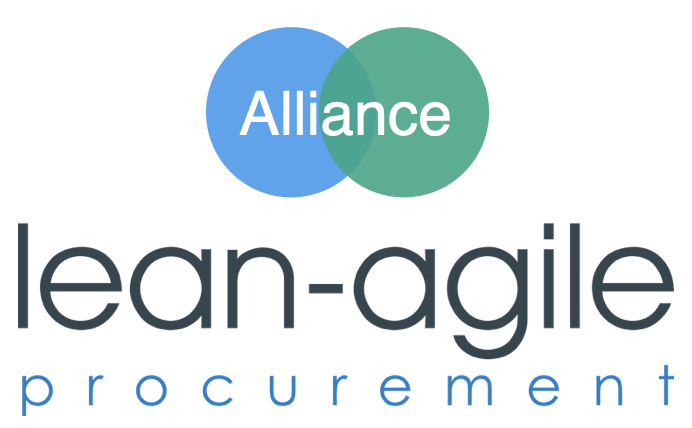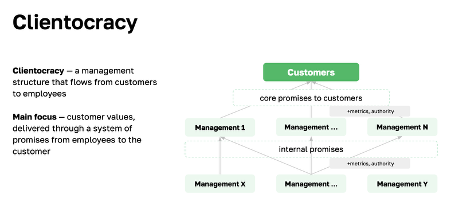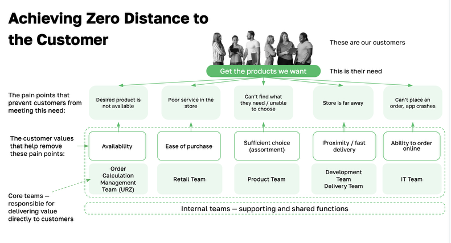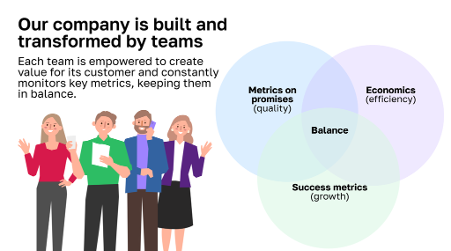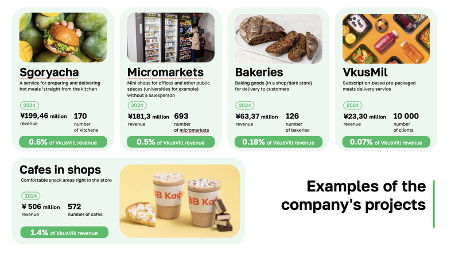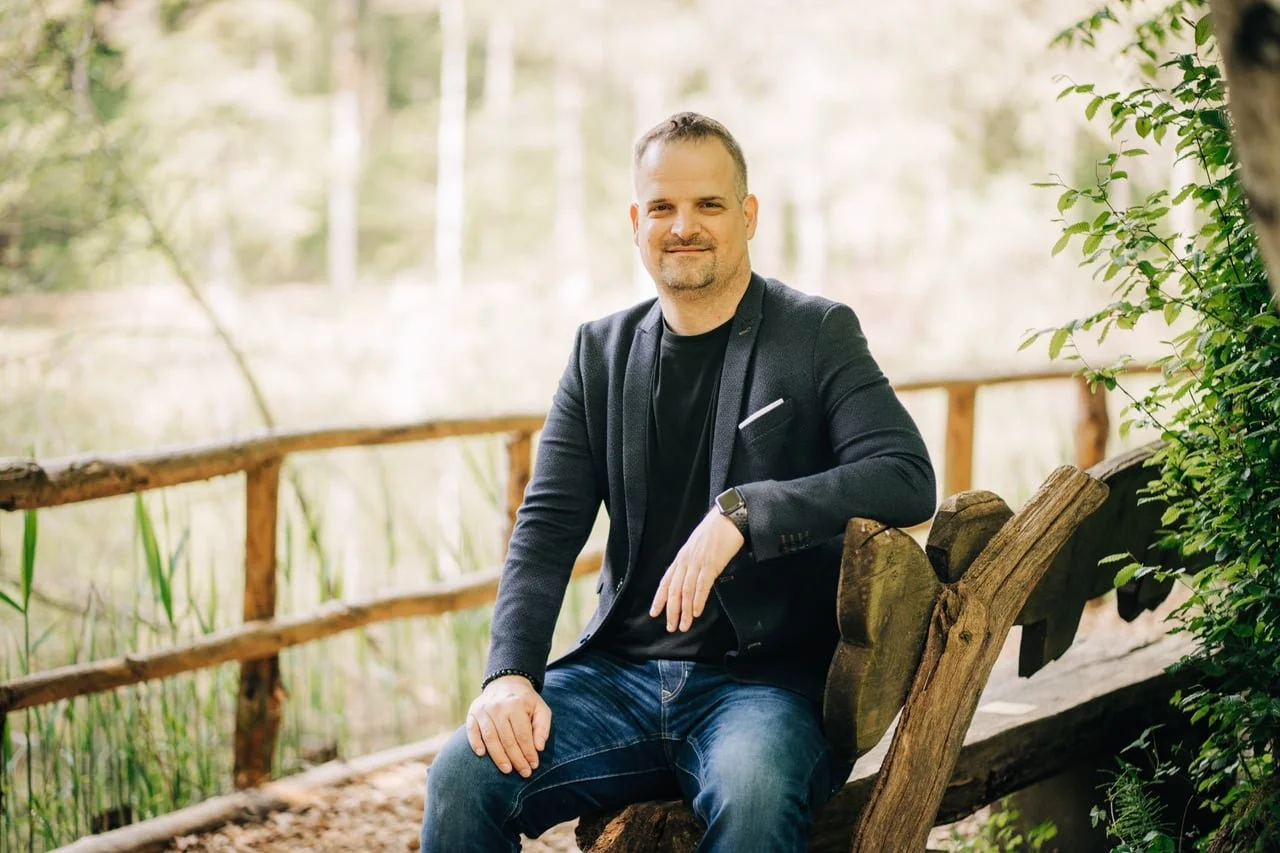High quality healthy food for nutrition is available to everyone (Ecosystem Case Study)
VkusVill, www.vkusvill.world
By Ivan Smagin interviewing Nikolay Popovich, Head of Change Management and member of the Board of Leaders at VkusVill
Guest Blog | August 2025
Congratulations to VkusVill for their nomination at the 2025 Haier ZeroDX Awards! VkusVill was recognized for their Open Innovation Ecosystem driving circularity in the built environment.
As part of our collaboration with the Haier Model Institute (HMI), we proudly supported the 2025 Haier ZeroDistance Excellence Awards by nominating outstanding organizations, individuals, and case studies from around the world. We want to extend our deepest recognition to all participants, who are true pioneers in embracing new management models and fostering ZeroDistance with their customers, suppliers, and communities. Your innovative spirit is shaping the future of business!
I’m incredibly proud of Nikolay and VkusVill, one of our partners and nominees by the LAP Alliance, has truly earned this recognition through their progressive work!
Discover more about VkusVill and their Ecosystem Success Story through an insightful interview with their CEO Sem.
If you’re new to Ecosystems and the New Economical Engine read the linked blog post first.
Introduction
By combining a customer-centric mindset with an entrepreneurial internal culture, VkusVill delivers high-quality healthy food to millions and cultivates a FoodTech ecosystem supported by thousands of entrepreneurs.
VkusVill is an international grocery retail operator built around the principle of safe, healthy food. The company combines traditional brick-and-mortar stores with online ordering and free delivery straight to customers’ doors.
Recognizing that clean ingredients are a core value for its customers, VkusVill has redefined the standards of grocery retail. Step by step, the company is transforming the industry for the benefit of customers — partnering with suppliers to develop and launch new products free from preservatives and flavor enhancers, with naturally short shelf lives.
Today, VkusVill is an international company and one of the most recognized and trusted brands in Eastern Europe. We operate in more than 160 cities across Russia, Kazakhstan, Armenia, and the UAE. Since beginning our international journey in 2020 with the launch in the Netherlands, we’ve continued to expand our global presence. Our team unites over 30,000 people who share the company’s core principles and values.
ImageSource: VkusVill
How a focus on customer needs shaped a new management model, made the company a market leader, and keeps changing the industry
In 2009, Andrey Krivenko — the company’s founder — faced a simple but pressing problem as a consumer: there was no fresh dairy on the market without artificial additives. He decided to launch a small niche startup. Andrey already had extensive experience in traditional management, having worked as CFO at a food manufacturing company.
Seeing the flaws in conventional approaches, he brought together a team of like-minded people who believed in a client-centric business. The issue of ingredients and artificial additives was addressed radically: a dedicated quality team made up of professional dairy technologists began creating our own product quality standards and searching for suppliers who could meet them.
VkusVill’s own quality standards are stricter than government regulations. They are based on a complete ban on artificial additives in both finished products and the raw materials used to make them. This unusual approach — where a retailer takes personal responsibility to the customer for product quality — was revolutionary for the industry.
Beyond supplier selection, our technologists audit production facilities and run constant laboratory tests on products. We know exactly what’s in the food we sell, and we back it up with a no-questions-asked refund if quality or taste falls short of expectations.
It turned out — this was our blue ocean.
ImageSource: VkusVill - Andrey Krivenko, the company’s founder, at a VkusVill store
That initial customer need became the foundation for what would grow into a major business.
Two years ago, Andrey stepped back from the company’s day-to-day operations to focus on developing the theoretical foundation of a management model called Clientocracy. Drawing on insights from global companies, including the RenDanHeYi philosophy and Gary Hamel’s management ideas, and rooted in VkusVill’s own experience, this model has transformed the Russian grocery retail market and set new quality benchmarks for the entire industry and beyond it.
The Clientocracy concept, which shapes VkusVill’s business and brand success, aligns perfectly with the RenDanHeYi model: decentralization, constant and trusted connection with the customer, a drive for innovation, and creating a living ecosystem built on care for the customer instead of management hierarchy.
ImageSource: VkusVill
The food production industry faces mounting competition, rising raw material and logistics costs, and evolving regulatory requirements. To maintain profitability, companies often cut expenses, reduce losses during storage and transportation, extend shelf lives, and simplify storage conditions. This drives demand for additives and special packaging that preserve products’ properties.
VkusVill has consistently stayed true to being both the customer’s advocate and their trusted technologist, responsible for taste, quality, and freshness. Our main challenge is to keep prices competitive despite incurring costs unusual for traditional retailers — from product development and quality control to stricter storage requirements and higher write-off risks.
By adopting Clientocracy as our management model, we’ve created a new organizational structure, reduced hierarchy layers, shortened decision-making time, and lowered overall management costs. Instead of long-term plans and rigid control systems, Clientocracy relies on autonomous teams and room for experimentation.
In the Clientocracy model, there is no conventional CEO. Instead, a Board of Leaders is formed to make the company’s key strategic and development decisions. This Board is not made up of heads of departments, but of team leaders whose main responsibility is to deliver value to the customer.
This structure is core to the model and closes the gap between customers and management. In other words, the true head of the company is the customer, and the heart of the business is their needs.
Internal collaboration follows the same principle: for store employees and product managers, the focus is customer value; for lawyers, accountants, and HR staff, the “customers” are internal — other teams within the company.
This system allows VkusVill to operate with just three management levels — from a store floor to a member of the Board of Leaders. The result: reduced oversight costs, faster changes, and management expenses that never exceed 10%.
ImageSource: VkusVill
The principle of team autonomy means each team has the authority it needs to operate, creates its own guidelines, and sets up its own processes. Instead of following orders handed down from above, teams work within a system of promises — commitments to deliver the best possible outcome for their customer. These promises are defined within the team itself, along with transparent metrics that measure quality from the customer’s point of view.
Each team manages its own income and expenses, develops a fair system of motivation and rewards, runs experiments and tests hypotheses within its own budget, and sets aside part of its profit as a reserve for unforeseen situations.
What sets this approach apart from traditional methods is its openness, trust, and lack of outside control. There are no barriers or formal rules for communicating with top managers — who, by design, have no special privileges. Weekly, precise management reports give autonomous teams the information they need to make quick, well-informed operational decisions.
Humanity — genuine attention to the individual and their needs, an environment free from coercion, and a foundation of trust — is one of the core principles of Clientocracy. The system works because here people work for people.
ImageSource: VkusVill
At VkusVill, the Board of Leaders is made up of team leaders responsible for the key values that matter most to customers: freshness, product availability, health safety, affordability, ease of feedback to the team, and exceptional customer service. In each team, instead of KPIs, there are promises — paired with metrics to measure whether those promises are kept. For example, our technologists promise that our products will contain no ingredients that cause direct harm to health. Store employees promise there will be no expired products on the shelves. The development team promises that stores will be conveniently located — and has full authority to choose locations for new outlets.
Examples of store team promises:
• Receive complaints, feedback, and suggestions from customers directly — and respond themselves, with the customer care team only helping to fine-tune the wording.
• Sell a product to the customer at any price if needed (for example, when there’s a mismatch between the shelf price and the system price).
• Host tastings and determine the most convenient product layout for customers.
• Decide independently how many employees should be on shift and assign roles for each specific day.
Store team members share a single motivation tied to the revenue of their location, while R&D managers are motivated by margin growth from launching new products. Openness and automated analytics collection give every team the tools they need to make fast decisions — always in the customer’s best interest.
A constant focus on increasing customer value fuels an internal culture of entrepreneurship. New initiatives start as experiments — quick, low-cost tests — and launch decisions are made based on results. Any employee can access a budget for quick experiments — no approvals needed.
As Nikolay Popovich puts it: “We create an environment where teams find the best solutions themselves, make mistakes, and learn faster than any centralized system.”
ImageSource: VkusVill
Andrey Krivenko adds: “We want to build a company that doesn’t require management in the traditional sense, where people recognize issues and take responsibility for fixing them.”
In the coming years, the company aims to sustain annual growth of 30% and continue integrating AI not only into business management but also into key operations: from the internal knowledge base, product recommendations, and personalization, to in-store robotics for order assembly, demand forecasting, and assessing the freshness of fruits and vegetables.
Alongside growing VkusVill as a business, our team is committed to evolving the management model that drives its success. We have set a long-term goal to educate at least 10,000 companies on the principles of clientocracy through Beyond Taylor — a consulting company founded by Andrey Krivenko and Nikolai Popovich. It provides training and advisory services on the practical implementation of clientocracy. This initiative is an evolution and further development of the ideas successfully tested and refined at VkusVill. We also aim to support startups and businesses that share these values through TiltTech Capital, an investment fund established by Andrey Krivenko.
